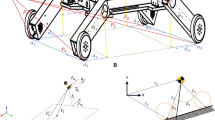Abstract
In cases where a wheeled mobile robot runs fast on a rough surface, the sensors mounted on the robot’s body may be destroyed due to the body acceleration and oscillation. In this article, we propose a new scheme to reduce the body acceleration at any specified location for mobile robots with the actuators set on the wheel axes. To achieve this, a combined ideal robot model is designed. In the combined ideal robot model, the location where the acceleration performance is at its best can easily be moved by setting only two design parameters. Next, a robust model tracking controller is developed so that the behavior of an actual mobile robot can track the combined ideal robot model. The developed controller has the following useful properties. (1) The body acceleration at any specified location can easily be improved. (2) The developed controller has good robustness for uncertainties in robot mass, pitch and roll moment of inertia of the robot’s body, and the position of the center of gravity.
Similar content being viewed by others
Explore related subjects
Discover the latest articles, news and stories from top researchers in related subjects.References
Hoffmann GM, Tomlin CJ, Montemerlo M, et al (2007) Autonomous automobile trajectory tracking for off-road driving: controller design, experimental validation and racing. Proceedings of the American Control Conference, New York, July 11–13, 2007, IEEE, New York, pp 2296–2301
Terupally CR, Zhu JJ, Williams RL (2007) Trajectory tracking and stair-climbing capability assessment for a skid-steered mobile robot. Proceedings of the American Control Conference, New York, July 11–13, 2007, IEEE, New York, pp 2861–2866
Lhomme-Desages D, Grand C, Guinot J-C (2007) Trajectory control of a four-wheel skid-steering vehicle over soft terrain using a physical interaction model. Proceedings of the 2007 IEEE International Conference on Robotics and Automation, Rome, April 10–14, IEEE, New York, pp 1164–1169
Bugeja MK, Fabri SG (2007) Dual adaptive control for trajectory tracking of mobile robots. Proceedings of the 2007 IEEE International Conference on Robotics and Automation, Rome, April 10–14, IEEE, New York, pp 2215–2220
Takahashi M, Yoneda K, Hirose S (2006) Rough terrain locomotion of a leg-wheel hybrid quadruped robot. Proceedings of the 2006 IEEE International Conference on Robotics and Automation, Orlando, FL, May 15–19, 2006, IEEE, New York, pp 1090–1095
Grand C, BenAmar F, Plumet F, et al (2004) Decoupled control of posture and trajectory of the hybrid wheel-legged robot Hylos. Proceedings of the 2004 IEEE International Conference on Robotics and Automation, New Orleans, April 26–May 1, IEEE, New York, pp 5111–5116
McKenna JC, Anhalt DJ, Bronson FM, et al (2008) Toroidal skin drive for snake robot locomotion. Proceedings of the 2008 IEEE International Conference on Robotics and Automation, USA, May 19–23, IEEE, New York, pp 1150–1155
Kimura H, Hirose S, Shimizu K (2004) Stuck evasion control for active-wheel passive-joint snake-like mobile robot “Genbu.” Proceedings of the 2004 IEEE International Conference on Robotics and Automation, New Orleans, April 26–May 1, IEEE, New York, pp 5087–5092
Oya M, Harada H, Araki Y (2007) An active suspension controller achieving the best ride comfort at any specified location on a vehicle. J Syst Design Dyn 1(2):245–256
Author information
Authors and Affiliations
Corresponding author
Additional information
This work was presented in part at the 14th International Symposium on Artificial Life and Robotics, Oita, Japan, February 5–7, 2009
About this article
Cite this article
Tsuchida, Y., Oya, M., Takagi, N. et al. Robust oscillation control of wheeled mobile robots. Artif Life Robotics 14, 357–361 (2009). https://doi.org/10.1007/s10015-009-0681-2
Received:
Accepted:
Published:
Issue Date:
DOI: https://doi.org/10.1007/s10015-009-0681-2




